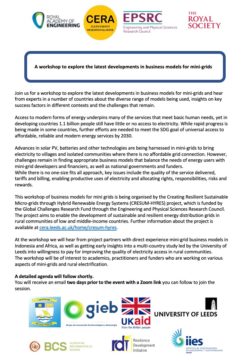CRESUM-HYRES and ACERA January 2021 Mini-grids Business Models Workshop
CRESUM-HYRES and ACERA January 2021 Mini-grids Business Models Workshop
On the 20th January 2021, the EPSRC funded CRESUM-HYRES and the Royal Society-funded ACERA projects hosted a free training workshop exploring the current and latest developments in business models for mini-grids.
The event was well attended and we had a fantastic range of speakers.
Watch the event recording here.
The workshop to explored the latest developments in business models for mini-grids. We heard from experts in a number of countries about the diverse range of models being used, insights on key success factors in different contexts and the challenges that remain.
The speakers were:
Peter Weston, Director of Programmes, Energy 4 Impact
'Mini-grid Business Models in Africa'
Eileen Lara, Head of Solar and Energy Efficiency, Centre for Research in Energy and Energy Conservation (CREEC)
Francis Kemausuor, The Brew-Hammond Energy Centre
'Mini-grids for last mile electrification: Ghana's experience'
Saut Sagala, Resilience Development Initiative
Cheng Wen, University of Leeds
Access to modern forms of energy underpins many of the services that meet basic human needs, yet in developing countries 1.1 billion people still have little or no access to electricity. While rapid progress is being made in some countries, further efforts are needed to meet the SDG goal of universal access to affordable, reliable and modern energy services by 2030.
Advances in solar PV, batteries and other technologies are being harnessed in mini-grids to bring electricity to villages and isolated communities where there is no affordable grid connection. However, challenges remain in finding appropriate business models that balance the needs of energy users with mini-grid developers and financiers, as well as national governments and funders.
While there is no one-size fits all approach, key issues include the quality of the service delivered, tariffs and billing, enabling productive uses of electricity and allocating rights, responsibilities, risks and rewards.
This workshop of business models for mini grids was organised by the Creating Resilient Sustainable Micro-grids through Hybrid Renewable Energy Systems (CRESUM-HYRES) project, which is funded by the Global Challenges Research Fund through the Engineering and Physical Sciences Research Council. It was also delivered in collaboration with the ACERA project which is funded by the Royal Society, UKRI and DfiD.
The CRESUM-HYRES project aims to enable the development of sustainable and resilient energy distribution grids in rural communities of low and middle-income countries. Further information about the project is available at here.
At the workshop we heard from project partners with direct experience mini-grid business models in Indonesia and Africa, as well as getting early insights into a multi-country study led by the University of Leeds into willingness to pay for improving the quality of electricity access in rural communities.

